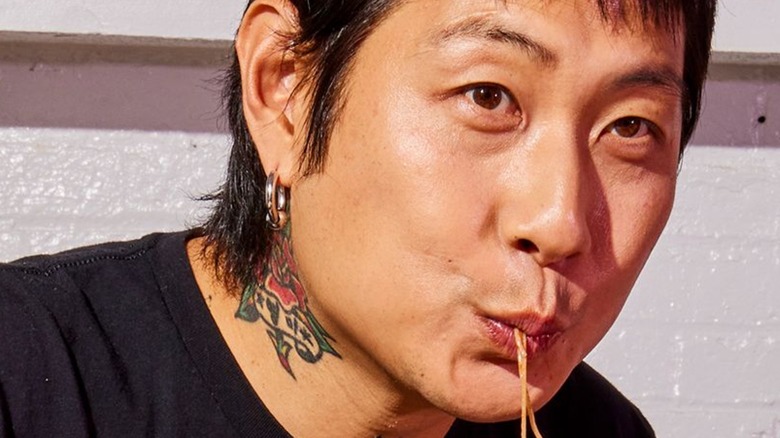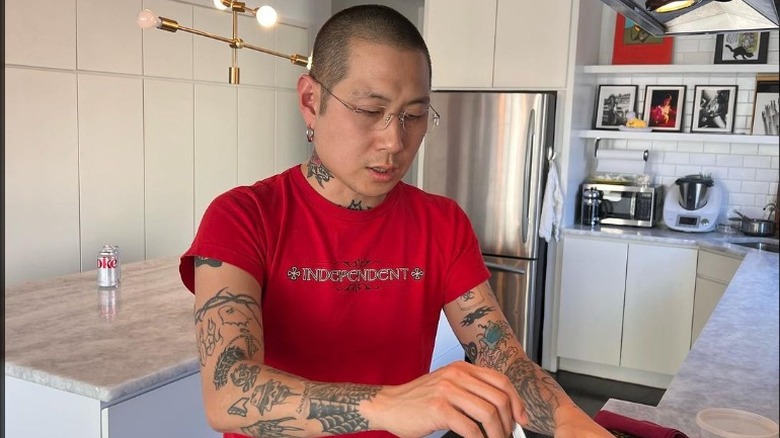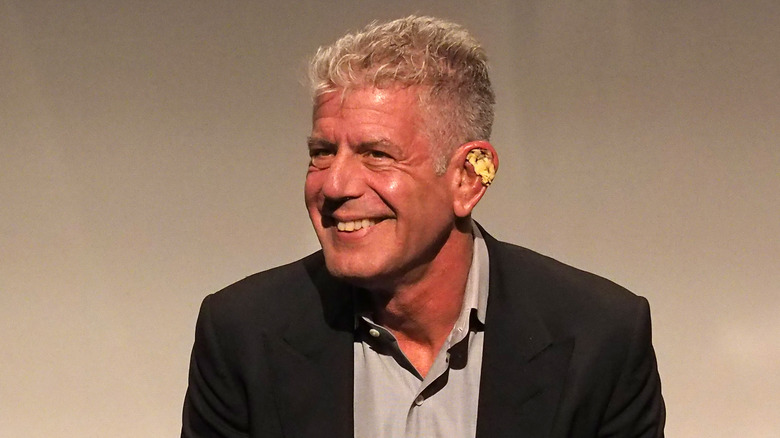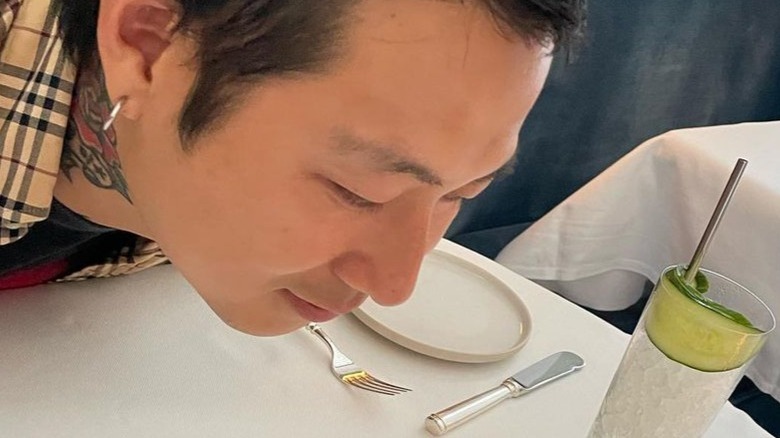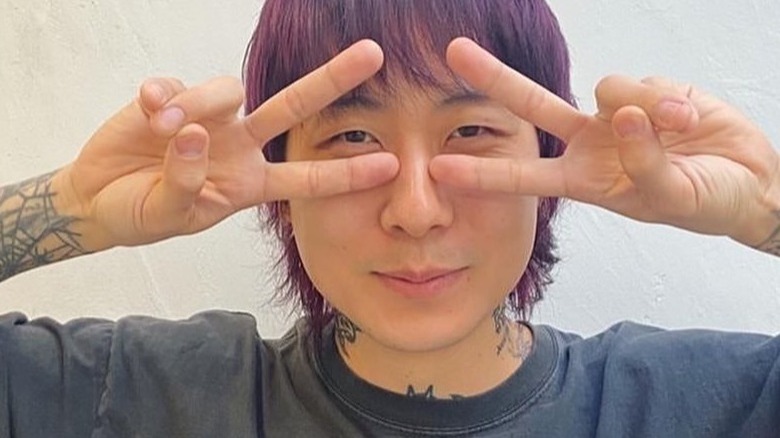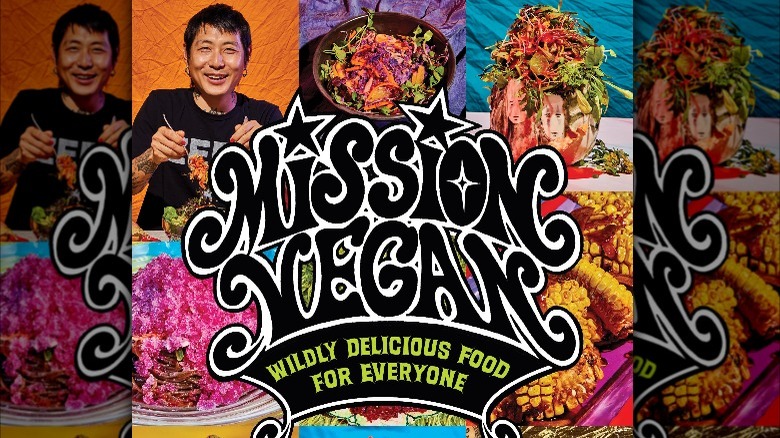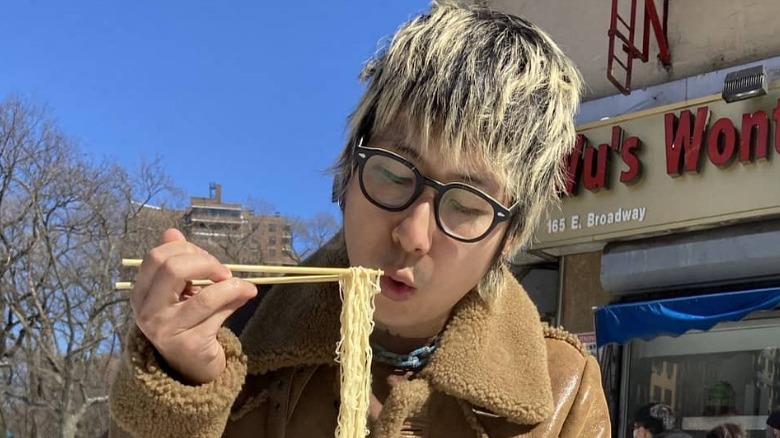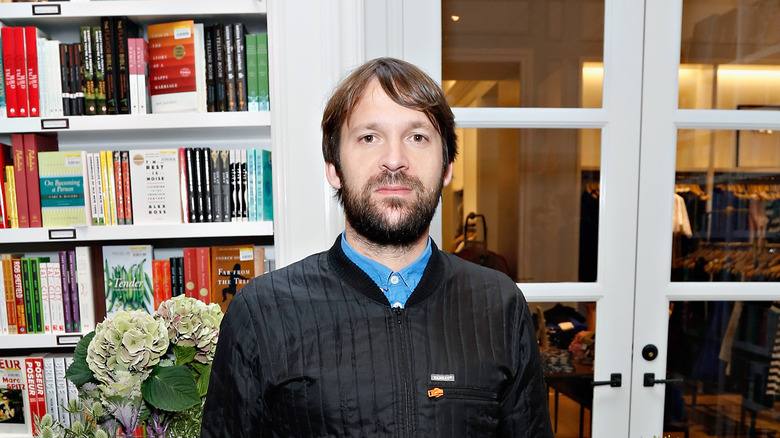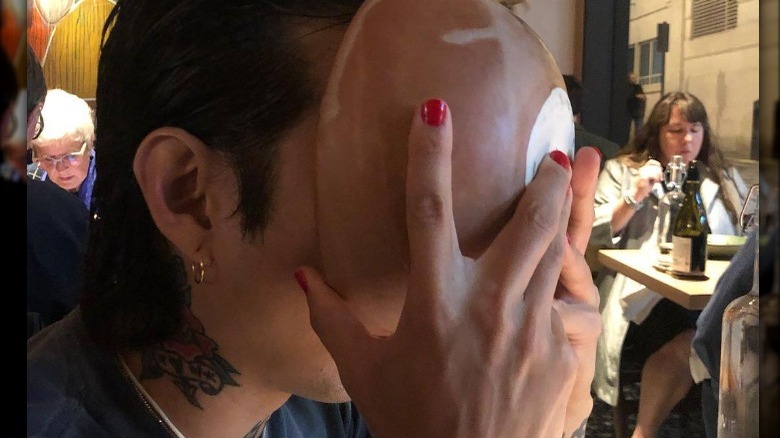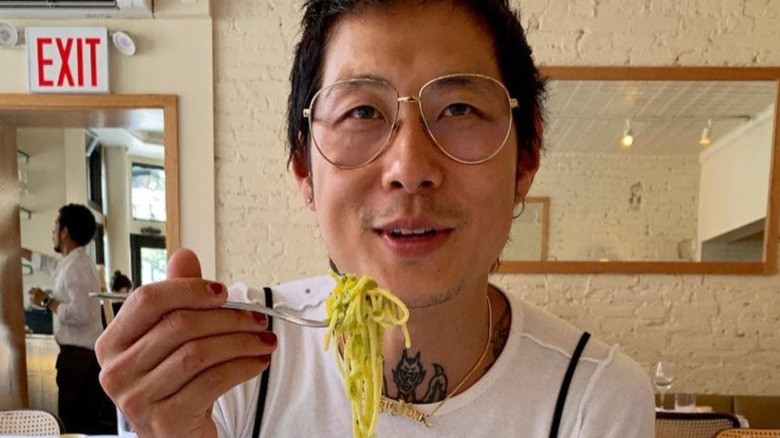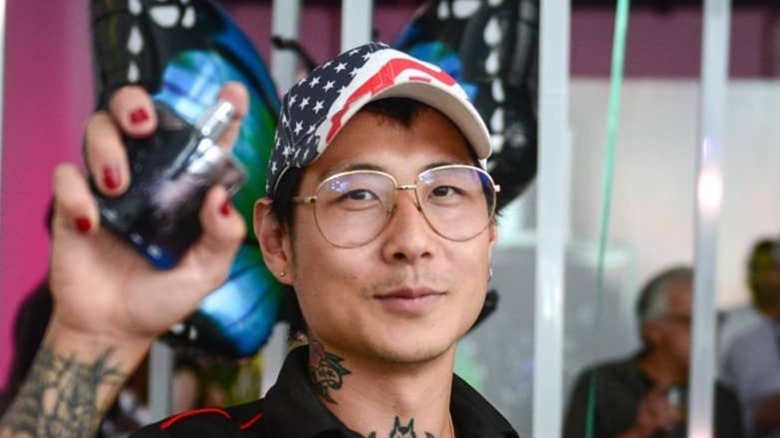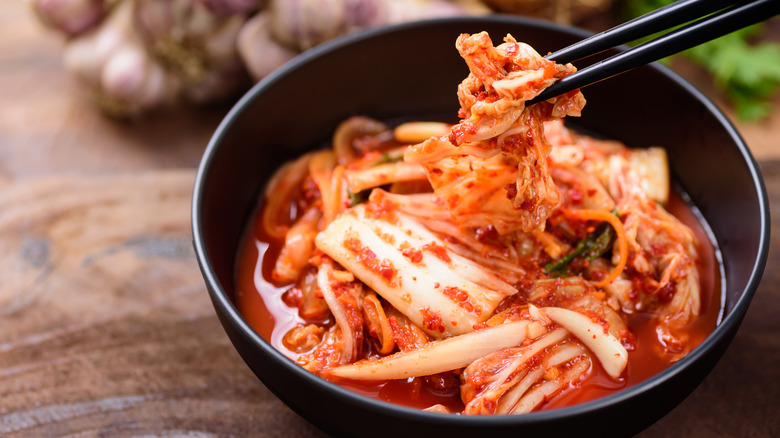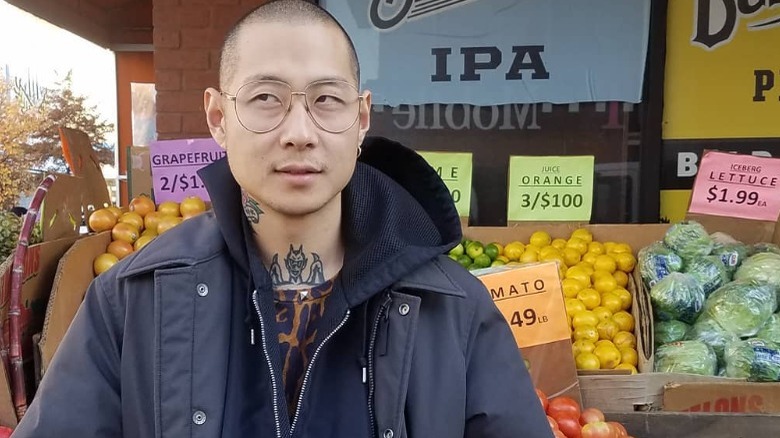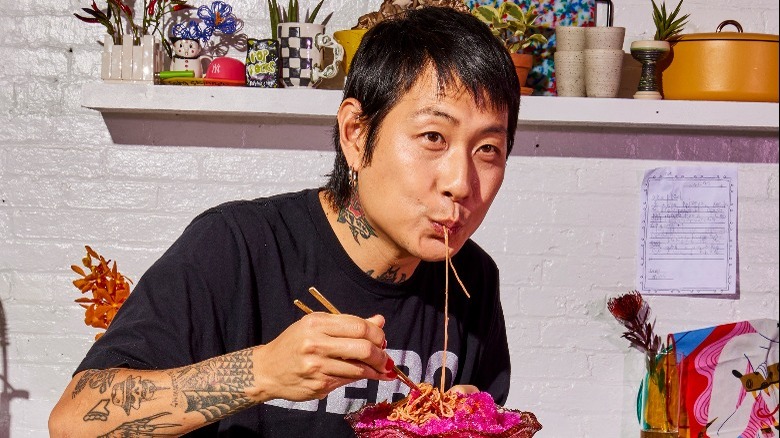Mission Chinese Chef Danny Bowien Shares The Keys To Kimchi And Moving Forward - Exclusive Interview
It's been a summer of devastating lows and impressive highs for Danny Bowien, but for anyone who's followed the career of the dynamic, wildly-unorthodox chef, that's to be expected. When Bowien launched Mission Chinese Food in 2008, he earned rapturous reviews for his brilliant riffs on fiery Sichuanese cuisine. An expansion to New York would follow in 2012, bringing more acclaim and massive lines to the Lower East Side. But Bowien's meteoric rise came crashing down when The Health Department shuttered the restaurant a year later due to "a significant mouse infestation." However, it would soon re-open with a Brooklyn Mission Chinese outpost to follow, marking a glorious second coming. The New York Times went so far as to compare his spaces to Andy Warhol's Factory.
Then, in 2020, scandal hit again when employees at the Lower East location brought to light allegations of abusive kitchen practices under Bowien's watch. The restaurant would eventually face permanent closure in September of that year, and last month, the Brooklyn location served its final meal. In response, Bon Appétit announced the definitive end of the "chef rockstar" era. (The San Francisco Mission Chinese is now the last one standing, although Bowien is no longer an owner nor does he have any managing control of the restaurant.)
But if there's something we've learned about Bowien, it's that after every re-birth, he has managed a more enlightened comeback. Now, the chef is introducing the world to his new cookbook "Mission Vegan" which offers equal servings of innovative recipes and thoughtful introspection. During an exclusive with Tasting Table, Bowien reflects on his wild, occasionally tumultuous past while looking ahead at the next chapter of his ever-fascinating life.
Danny Bowien comes to terms with the closing of Mission Chinese Brooklyn
It's been a bit over a week now since Mission Chinese in Brooklyn closed. How was your last staff/family meal? And what are you feeling now?
It's always sad to close a business or for anything that you really love and care about to come to an end. I feel very fortunate that we were able to go out on a high note. And honestly, the staff that we have — I say "have" because we're all still in contact — and I really am very thankful for the team there.
It was very bittersweet because everyone that was there is moving on and doing new things, but we're all better because of each other. So I'm really grateful for that. I think that really does influence how I'm feeling now, which is just really grateful and thankful. It's always funny because staff meal is such a ... it's the moment of pause. If you don't work in restaurants, or if you haven't worked in restaurants before, it's a moment that all the staff sits down and takes a breather. Sometimes they eat the staff meals, sometimes they don't. But this communal time of "us" before service starts.
And it's funny because each day the staffing would rotate. Certain people would make it. But the last month, especially, different people would make different things and also the staff was coming in to eat at the restaurant. For the last month, they would make these surprises for each other. [When] the last day came around, the last staff meal was pretty much just using up odds and ends — a lot of vegetables and perishables because for the last week of Mission being open, we transitioned to doing Mission Vegan, based around the cookbook. We tried to run it tight, but there was some inventory looked over that we cycled through.
And so last day, I think there were cold sesame noodles. There was some cauliflower. It was all mostly vegetarian, but it was cool. That day we gave everyone a copy of the cookbook and some good friends of ours dropped off some gifts that we gave to the staff. And it was just a really ... I don't think anyone really ate the staff meal the last day. We made it. We all packed it away and took it with us for later that evening.
How Anthony Bourdain opened Danny Bowien's eyes to the issue of food waste
That's a nice transition into another question we had, which was about food waste. You worked with Anthony Bourdain on a food waste movie a while back. Especially during the pandemic, food waste became such a poignant issue. Could you reflect on where we were then versus where we are today?
I mean, with Anthony ... what an influence. He was such a positive influence. I went into that project, "Wasted!" the food documentary ... they asked me to participate. I was more than happy to because I just wanted to learn more, as well.
And my eyes were quite open. They were open to just the amount of food waste that's created. [I started asking] how we could be using food waste to help, as opposed to literally just wasting it, throwing it away? Because chefs adore Anthony Bourdain, they took it as a creative challenge. And I really enjoyed seeing that process happen, the level of creativity that happened in kitchens. And I do think that project had a huge influence on that.
Creatively, in the cookbook, there are dishes like the salted lemon kosho. That sauce came about a little bit after we filmed "Wasted!" and at the time we were using preserved lemons that we sourced that were really amazing. And then I think at a certain point, we were having a difficult time getting them. And I was just kind of like, "Well, why don't we just use the lemons that the bar's using?" And also some fresh lemon juice. But they're just throwing away all these lemons they're juicing. They're juicing a case of lemons a day. And that's how that started.
So I can speak for myself in that the influence continued to foster itself in creative ways. And then, not to mention, in New York City during the pandemic, I was approached by a good friend about community fridges and things of that nature, which are ... I don't see them as much [now]. But there was a moment where there were just tons of community fridges around. And I thought that was a really creative way to repurpose food that would otherwise be wasted or thrown out.
How culinary school shaped Danny Bowien
Let's go back to the lemon. I'm not sure if this was the recipe in the cookbook or not where you use lemon pith.
Yeah.
In your book, you said, "I learned in the mainstream culinary school never to use lemon pith and then began to use it. And it's great. It gives so much flavor." Have you had more experiences like that, where you've learned things in mainstream, maybe Western culinary ideology, and then have unlearned them as you experienced cooking?
Yeah, that's a great question. So I remember when I was in culinary school in my baking and pastry program, which I was hugely not successful at because I was a young ... I wanted to be a chef. I wanted to throw all my different ideas together. And if you bake, you have to follow a very precise recipe. And it is definitely your roadmap. It is not a loose thing you can take and just add this or that, or not add enough baking soda. It doesn't turn out properly.
So in that course, I learned to appreciate two things: I found myself questioning this because they were like, "You have to remove the lemon pith when you're making certain sauces and everything else, because it yields a bitterness to a sauce." Bitterness was kind of shunned. At the same time, there was such an appreciation for dark chocolate. The chocolate-making course we were doing — we would make coffee ice cream, and that you would balance the bitter with the sweet. Back then, even, I really did appreciate the bitter flavor profile. And then I started cooking and when I started doing Mission, one of our dishes we did back in the day was we did rice cakes, bacon with bitter melon. And I really became obsessed with this bitter flavor profile. And this is not the precise recipe. The recipe for the lemon sauce started by using lemon because it went from that idea in culinary school being like, "Well, we can use bitter chocolate, but we're not supposed to use lemon peel. That's fine." Back [in culinary school], I just followed the rules. I just wanted to pass the course.
The test Danny Bowien's food has to pass
When did that change?
I went to work at a sushi bar. I remember there was a sushi bar in San Francisco called Sabo. They had this roll there, the dish that had thinly sliced lemon, but there was a whole lemon. And that was my favorite thing. It was lemon, bluefin tuna, kaiware, cucumbers, sesame seeds, and ... sea salt. That was it. But there was something about that whole lemon and that bitter [taste] .... That pop ... That tangy, acidic lemon pulp. But the bitter rind mesmerized me. So that was an eye-opening experience for me.
I've been taught when I was going to school to work away from that. But if you look to other cultures, you really do see that bitter as a flavor, that it's embraced. I feel like it's just as intoxicating as eating something that's really spicy. It pushes you. It challenges you to accept it. And I love that about it. So with the lemon sauce, when we were recipe testing it, there was always this inkling, "Should we add sugar? Should we balance this?" But I love it's just really in your face.
But to answer your question, there was probably a point in my career where I was like, "Rules are made to be broken." We need to go do that. But I do think understanding basic principles and really understanding why [those exist is important]. I'm always asking, "why?" And I'm also asking, "why not?" Sometimes I'm like, "Oh. I have this great idea. We've got to do this." But sometimes it doesn't work. But it is nice to stumble upon these happy surprises where you're like, "Oh. This works."
Food, a lot of it is storytelling, too. If you set someone in front of me and I'm making you food, I can tell you the story. But there's also when you're making a cookbook, there's also like, "Well, it has to pass the test of if someone just tastes it, you're not there to tell them why or convince them or sell them on it, is it delicious?"
So my whole [cook] book was based around, "is it delicious?" And so I think to your point, if you're going to unlearn any sort of ideology or any sort of referential advice that someone gives you, it has to pass the "is it delicious" test. And that's something I really look to with cooking and with creativity. It's like, "Does it taste good?"
Danny Bowien on cooking with recipes
Let's go back to the stories in your cookbook, because you give us quite a bit of them — more than in a lot of other cookbooks. We hear the stories of your life through the recipes — where you've been, where you've cooked, where you've eaten, where you've traveled. On a deeper level, what is a recipe to you?
I've been very fortunate. I'm a Korean adoptee. I grew up in Oklahoma. My parents were both American, Caucasian. And I was adopted about two months old. So food has been this vessel for me to really discover and find out a lot about myself and other people. But really it's been this roadmap to self-discovery.
And I think recipes to me are like that roadmap. And sometimes you go far off the path ... At certain points, we'd have 40-plus items on the menu. And it would get to a point where I wouldn't even remember [the recipes] sometimes. It's like a musician that has a really big catalog of songs. And sometimes they just forget the songs. And you're like, "Wait." If you ever go see live music and the guitar player forgets the song they wrote, you're like, "How can you do that?"
It's difficult to codify or to memorialize these moments, but I think it's very important. And I think recipes are very, very important. As a young kid, I remember watching my mom cook, or me and my relatives at a cookout, they would be following a recipe. There was a moment in my career where [I] didn't follow recipes. I felt like there was a very big importance in tasting and seasoning by hand. You really get the soul and the emotion, the feeling of whoever's cooking that food for you through that rather than someone measuring something out on a gram scale and tasting like what I call "restaurant food."
What Danny Bowien's new cookbook is really about
Do you ever cook like that, still?
I think that when I cook at home, that's certainly how I cook. This book was really designed to feel like every dish that you make, someone made it for you. It's designed to be cooked at home. But I think recipes are hugely important for consistency and accuracy ... There are a few dessert recipes in here because I was like, "I have to get better at things I'm not good at." And it's part of that journey, that self-discovery of food. And the recipes are there to definitely keep me in check and keep me on the path.
So I think that's what a recipe is. And I think now, along the lines of professional kitchens, the lines of savory and pastry are very blurred. Everything is memorialized. Everything is codified to where it's accurate because in restaurants you want consistency. You want, ideally, the feeling of someone having cooked this with love for you, and it's just like home cooking. But at the same time, you want to be the same every time.
And so when we were recipe testing for this book ... I had amazing, amazing help. My recipe tester, and the person who helped me develop some of the recipes when I would have these ideas ... her name's Mariko. She would be like, "Okay, well. We're here. So is it a half teaspoon? Or is it a teaspoon? I got to know." So I think that I've learned a lot in this process that recipe is very important.
But on a larger scale, to me personally, in my journey, this whole book is really about self-discovery. I feel very, very fortunate that I've been able to go along on this journey and I've had the opportunity to explore, to a degree, my own heritage. And there are a lot of moments in the book where I'm like, "Wait. This is a food that I would have been eating had I grown up in Korea." Some of them. Not all of them. But I didn't have Korean food until I was 19.
Danny Bowien on his friendship with René Redzepi
Your cooking is very focused on community. The community that comes around to eat, the community you create by making a space, the community that supports you in cooking what you're cooking, and have supported you through your ups and downs. René Redzepi called you after you shut down Mission for the first time and gave you advice to keep on going. What's the most important thing that somebody's told you to keep on getting through hard times in a very hard industry?
That call from René was such a moment. He called me, and it was a really pivotal moment for me because I think Noma was the number one restaurant in the world at the time. And I felt ... at that moment, I felt very small. I felt like we failed. What am I going to do? Just all the feelings that you feel the first time you fall down as an adult in a big way. And it was a pretty bleak call. But I love that about René. It was really ... it was just to the point. He's like, "This is what's going to happen. This is what you have to do to move ahead." And I was really thankful for that.
I think the best advice I've gotten ... I don't know if this advice really, but I remember my partner, Mino's mom, Youngmi. And there was a point in my career where I just felt like apologizing because I think at that point, I think one of my restaurants had closed. And I just was having this moment of ... I was in a really bad place personally. I was self-medicating in really unhealthy ways. And I just was not at the place I needed to be in my life.
But I apologized. "Hey, I'm really sorry." At the time we were married and so I know I was like, "I know that I've fallen short. I hope I'm not embarrassing you. Sorry." And she stopped me and she's like, "Look, I want to tell you something ... I'm never going to be ashamed of you. And I'm never going to be embarrassed of you because you've done what a lot of people [wouldn't have]."
Danny Bowien on apologizing
How did that help you move forward?
This is what she told me: She said, "You took on a risk that some people would never be brave enough to take on." And she was just really instrumental in helping me understand that. That was a moment in my life when I understood that failure is an option. And that you're going to have these moments in your life, whether it's professionally or personally that you're going to hit a roadblock or a road bump on the speed bump on the way along your journey.
And I just felt really thankful because ...most of the most people [say] all of the cliché things like, "Got to fall down, pick yourself back again. Keep your head down, push forward." And those for me, they went in one ear and out the other. And I'm very thankful for people along my journey that have reached out and given me really amazing advice. But at that time I feel like, still professionally and personally that's the best advice I've ever gotten. Or the best reassurance I've ever gotten was, "It's okay."
She was basically just saying "It's okay. It's going to be okay." And every time you have a moment, every time in my life since then when I've had a moment that I felt unsure, I referenced that point. Because I was able to be really vulnerable and say "Look. I'm sorry." And I was younger, that was a while ago. That was probably seven years ago or so. There's always this mentality that in the world of chefs, back in the day especially, that the chef is always right or supposed to have this wealth of knowledge. And I did not know what I was doing a lot of the time. And I was very humbled. And it felt really cleansing and great to be able to say, "Hey. I'm sorry."
Danny Bowien on mental health in the industry
You, more than most, have felt the ups and downs of what it is to be a celebrity chef, which was something that Anthony Bourdain, who you worked with, questioned a lot. Can you reflect on those ups and downs of being put on that pinnacle from where you are today?
Yeah. I think I talk about in the book a little bit. I think that the older I get, the more I learn that things that used to work for me when I was younger don't work anymore. And when these challenging moments in my life would happen professionally and personally, I would run to things that I thought would help make it better. Which for me, it was diving into my work, or medicating in unhealthy ways. And I think that I've really learned over time, your body also just tells you, "Okay, that doesn't work anymore." I just turned 40.
So I think that to your question, what I've learned through all of the ups and downs is that I think that mental health is something that's really been discussed a lot more. And there are other people that can articulate this in a much better way than I can. Chefs are people-pleasers. And our job ... It takes a certain type of person to go into cooking and food and hospitality. And what I've learned is over time that you're always taught to put everything else and everyone else before yourself. But what I learned is that, unless you're truly happy, if you don't take care of yourself, you're not going to be able to take care of other people. And that's what drives me. I like taking care of other people. I love interacting and making people happy through food, and through this experience of food. It's a really powerful thing.
If I'm not, in myself, in a good place, in a healthy place, in a happy place, then I'm not going to be able to make other people happy, to the best of my ability. And so what I learned over time through all the ups and downs is that [mental health] is very important. To me, I [used to think] happiness came through substance. Or it came through accolades or impressing other people or getting stars or whatever. Really great reviews.
Danny Bowien on adulthood
What changed?
In all these ups and downs ... sometimes I found myself just running in place. Felt like I was on this hamster wheel, just going around and around circles. And it all fell apart, and I've had to put it back together. But I'm really thankful to get the clarity and to be able to reflect. And look, life can be very long. In our world, especially in the food world, everything is so cyclical, especially with internet and everything else. Everything seems to be so fast. It's here and then it's gone. It's here and then it's gone. And there's this struggle to maintain relevancy.
But I started to think outside of that with the cookbook and with recipes and memorializing things. And for so long, I just lived in the moment. And now I think I'm trying to live beyond the moment. I'm trying to leave something behind. And so that's something I've learned through all the ups and downs is that there's always something to be thankful for. I'm really thankful that I'm able to do what I do. I'm thankful that I'm able to have this journey of self-discovery through food. I'm thankful that I ideally can help people through this journey [that I can] find out about myself and get myself to a better place so that I can help others. Because I think we all have those moments. Especially now. These moments where I'm like, "What am I doing? What kind of lasting results am I leaving?"
At the same time, I don't want to be too heavy and too deep. I want to have fun while I'm doing it. I think that's the other thing. For so long, I put so much importance on certain goal markers in my life. And I thought this would be the moment where I'm going to finally be happy. This would be the moment when things are going to be good. That's called being an adult, I think. It's going to be good sometimes. It's not going to be good sometimes. How are you going to deal with that? And I think the best way I've dealt with it is having a lot of experience now in these moments that are of uncertainty or failure or missteps and being able to reference those. Being like, "Okay. Well, I'm here now. I've been here before." If I can reference back and think back on like, "Well, okay. I've felt like this before. What did I do then? Did that work for me? Did it not work for me?" And then I move forward from there.
Danny Bowien's kimchi journey
Let's go back to your book. One of the journeys that you took in your book in terms of culinary knowledge was kimchi. You give us 12 recipes for kimchi in your book. You can still remember the first time you ate kimchi. What's the significance of kimchi to you?
Okay. This is probably going to be the most chef-y-sounding thing I'm going to say, it really does captivate me. Kimchi, it's never exactly the same every time. When I traveled to Korea I would go to eat at certain places I would know. And somehow I would go to certain places and it would just always taste the same, right? But this one person's always making it. I know that Young-mi's aunt, or her aunt's house, she has an amazing kimchi collection she grows the stuff in the backyard and makes it all there at her house. And so I really try to capture the essence of that. But it is, for me as a professional chef, it feels like an impossibility to always replicate and make it exactly the same. And I've actually embraced that.
So earlier, I was saying that the goal is for everything to always be consistent. But this is the one where it's a fun journey to take. There's something about it where every time you can get it down. There's a point where you will get to where you'll almost be getting it the same every time, right? But it's kind of like bread baking, right? I look at kimchi and bread baking as kind of the same because it really depends on the climate temperature, quality of the ingredients, what time of the year you're getting the ingredients.
Why Danny Bowien loves kimchi
How do you get kimchi right?
So it's a very humbling experience making kimchi, I think. But it's also something that I think that people tend to overthink and overcomplicate. At the end of the day, it's vegetables or whatever you're fermenting and salt, right? And there's a lot of concern and fear making it. Specifically like, "Do we need to do this, this, or this? Are there certain variables we need to watch for?"
So I definitely try to include recipes that I really wanted to get good at personally making. I tried to include recipes that I'd never seen before like the watermelon and the pineapple kimchi. And just the way that the sugars in the pineapple react with the salt and over time it creates a fermented, amazing product. It was really fun doing that.
But kimchi to me, it's such a really fun thing because it also forces you to slow down. I think when everyone started getting really into sourdough and making starters and stuff, there isn't this instant gratification. There can be. You can eat kimchi right away, right after you make it. I think that the instant ramen kimchi [you] could eat instantly, like in the book. But there's something about being able to taste it throughout its progress and then finding out what works best for you, or what you like the most, at its most pleasant stage.
So I like that. I think for this book, it really is a testament where I am personally as a cook. Whereas when I started cooking, everything had to be really hot and fast, really instantly. [Now] I have to taste it. I have to get this reaction right now. But then, with kimchi, it does take time. It can take as little as long as you want, but I think most of the recipes [hit the] three or four-day mark. I think they're really great around that.
What's next for Danny Bowien
We have one last question with you, which we know you've been hit with at lots of stages in your life. We want to know, what's next for you, what are the next projects you're delving into?
That's a good question. I don't really know right now. I definitely love food. I'll quite certainly always want to be involved in food. I'm not sure — you know, it's only been a week since the restaurant closed in Bushwick. You know, again, I'm not used to slowing down. I think for that the longest time — the last 10 years — it's been one thing to the next thing to the next thing. And there's like a certain — like I was saying before — being able to slow down, and being patient right now because I don't want to feel like I'm running in place.
I'm really grateful for the opportunities I've had — I love interacting with people and I love interacting with food. You know, my dream scenario would be, I'd love to do a food-based travel show, that would be amazing. I've always told people, "I'm not your expert," I'm really not. I'm Korean, but I didn't grow up eating or making Korean food. So, it's a very different approach. I thought that was what I always loved most about food travel shows. You know, I love "Diners, Drive-Ins and Dives," it's one of my favorite television shows. It always has been one of my favorite shows, because Guy [Fieri] is just about to go to these places, connect with people on a really authentic level, get his hands dirty a little bit, get in there with people, but really allow them to like shine. Because a lot of the times they'd come in, Guy is a really amazing chef and knows what he's doing, but a lot of the times he would let people take the stage. And so, for me, I'd love to learn more, and I'd love to do that. But I'm not really sure. There's not like a definitive thing in front of me right now. But I will say, you know, I know that it will be something food-based. I love this cookbook, too.
Don't miss out on Danny Bowien's new cookbook! "Mission Vegan" is available now for pre-order and will be officially released on August 23. And be sure to check out the San Francisco location of Mission Chinese Food.
This interview was edited for clarity.
